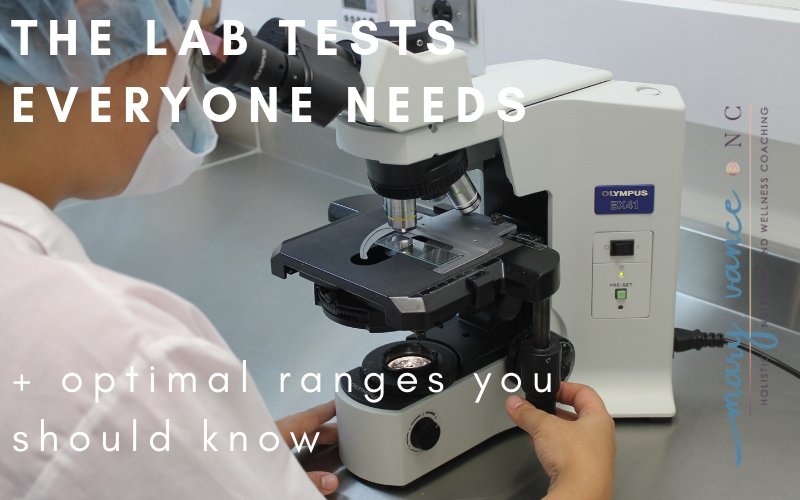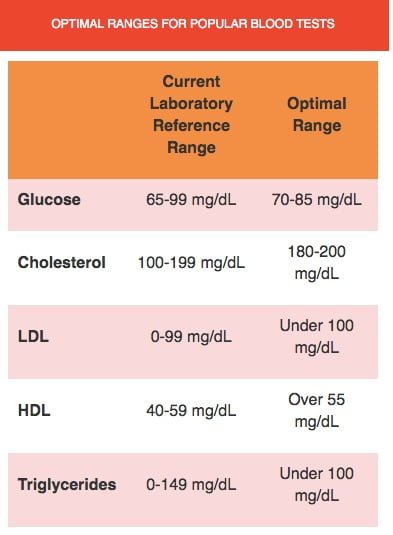Regular blood work is a great way to get an inside look at what’s going on under the hood. You can get valuable information about metabolism, hormones, inflammation, deficiencies (or excesses), lipids, and blood sugar, for example.
Each marker on a lab test has a range, and anything outside that normal range is flagged as abnormal. But if you or your clinician is savvy enough to read between the lines and also scan for optimal ranges, you can get even more info than just the face value numbers and spot imbalances before they become more serious.
Most insurance allows yearly blood work as part of regular wellness checks/preventive care. But your doctor may only request the basics like cell counts, lipids, and fasting glucose. There are a few additional panels and markers everyone should request in addition to the basics. Some of these markers, if they are normal, only need to be assessed every other year or so once you’ve had them done.
If you’re in good health and your labs are generally OK, you may only need blood work every other year. But if you come back with abnormal markers or if you have thyroid imbalances and need to know your numbers to dose meds properly, for example, you’ll need labs more often.
Fortunately you can order your own lab work these days! I love that there are direct to consumer options that allow you to take your health in your own hands. I use and really like Direct Labs (you can use this link to get into their test menu as well as to see my recommended test panels). It can often be a fight to get your doctor to agree to the markers or panels you want.
Women especially have their health needs overlooked. I can’t tell you the number of times I’ve encountered women with hypothyroid symptoms who may have a normal TSH (main lab marker doctors use to diagnose thyroid issues) and are dismissed without further evaluation (free T3 and free T4 hormones). They may have subclinical hypothyroid, meaning their TSH may be fine but their other thyroid hormones are slightly off, and if those markers aren’t tested, these people fall through the cracks without getting the care they need. True preventive care is catching and addressing this issue BEFORE it becomes actual hypothyroidism.
Lab Tests Everyone Needs (with optimal ranges)
Most of these tests should be done first thing in the AM after fasting 12 hours overnight (water only). Stand-alone thyroid panels do not need fasting. You can order all of these tests yourself by clicking here. I recommend the 10 Most Important Tests panel (which includes all of the below except insulin and B vitamins).
- CBC or complete blood count is the basic panel to assess red and white cell counts, iron, and information about the size and color of the red blood cells. Can identify anemia, infection, elevated or decreased immune activity, B12 deficiency. Make sure you request ferritin (often not included), the protein that helps the body store iron. High or low ferritin is problematic and can give you clues about inflammation, anemia, and how to adjust your diet accordingly. For women, ferritin should be above 20 but not higher than 80 (ideally around 30-50). In men, ferritin should be in the 30-40 range. More on ferritin here.
- Basic metabolic panel provides an overall picture of your body’s chemical balance and metabolism. There are about 14 markers in this panel, typically fasting glucose, markers for liver and kidney health, mineral levels, and electrolyte balance. You want fasting glucose to be around 85. Over 95 and you need to take action. Click here for info on how to lower blood sugar. More on blood sugar balance here.
- Thyroid panel: typically your doctor will only request TSH (thyroid stimulating hormone), but that is NOT an accurate picture of thyroid health. You need TSH, free T3, free T4 at a minimum. Ideal TSH is between 1.0 – 2.0, but the lab range is much wider than that (usually 0.5 – 4.5) which is why it’s important to look at the actual numbers and not just assume if it’s in range that it’s fine. Free T3 is the most important thyroid value to check and should be above 3.0. Request thyroid antibody panels (typically TPO) if you are hypothyroid to rule out Hashimoto’s. More on hypothyroid here.
- Vitamin D: optimal range is 40-60 mg/nL (some practitioners say 80). Important for immune health.
- hs-CRP: C-reactive protein (CRP) is a sensitive marker of systemic inflammation. It is a powerful predictor of coronary heart disease. The highly sensitive (hs) cardiac CRP test measures C-reactive protein in the blood at very early stages of vascular disease, allowing for appropriate intervention with diet, supplements, or anti-inflammatory therapy. Levels for optimal health should be below 1.0, though lab ranges say anything under 3.0 is OK.
- Hemoglobin A1c is a great way to measure blood glucose. This test measures a person’s blood sugar control over the last two to three months and is an independent predictor of heart disease risk in persons with or without diabetes. It should be below 4.5.
- Fasting insulin: insulin resistance is a major factor in disease risk. Insulin should be below 5 (ideally around 2). Higher insulin levels mean increased fat storage and that you’re eating (or drinking) too many refined carbs and sugars, or too many carbs in general. You can control insulin with diet, exercise, and supplements.
- Lipid panel with cholesterol and triglycerides. Read more about cholesterol here.
- B12 & folate can give you an indication of MTHFR defects (if high for no reason), deficiencies, or if diet changes are needed.
- Homocysteine level is a great way to identify a vitamin B6, B9 (folate) and B12 deficiency. Elevated levels of homocysteine are a risk factor for heart disease. Levels should be below 7.
Read more about lab tests and values here. If you don’t speak lab work, you can take these results into your doctor for analysis. Please be aware though that many doctors do not scan lab results for optimal ranges and often only consider abnormal findings. That’s why it helps to understand the optimal ranges. We really do have to be out own health advocates.
If you want to take it a step farther, consider stool testing for hormones or gut health. I use the GI MAP which is an awesome and sophisticated assessment of overall gut health including pathogens, parasites, candida, inflammation. I like the DUCTH tests and the BioHealth hormone tests for sex and stress hormones. You can also order all those panels here.
Pin it!

Mary Vance is a Certified Nutrition Consultant and author specializing in digestive health. She combines a science-based approach with natural therapies to rebalance the body. In addition to her 1:1 coaching, she offers courses to help you heal your gut and improve your health. Mary lives in San Francisco and Lake Tahoe in Northern California. Read more about her coaching practice here and her background here.









